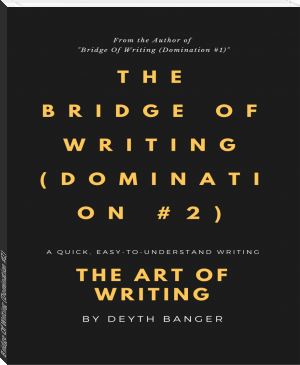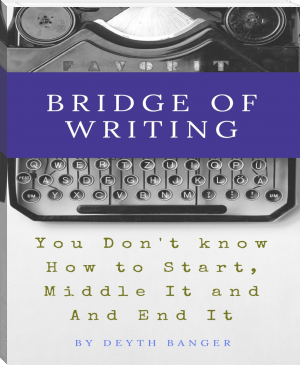Bridge Of Writing (Domination #2) - DeYtH Banger (e book reader android .txt) 📗

- Author: DeYtH Banger
Book online «Bridge Of Writing (Domination #2) - DeYtH Banger (e book reader android .txt) 📗». Author DeYtH Banger
1. Attention to Detail
Great writers are observers, always taking mental notes and noting subtle changes around them. This attention to detail not only makes them fantastic editors who can spot the smallest grammatical error during a read-through, but it adds a special touch to their writing, too. No descriptive detail gets left behind.
2. Discipline
Writers who excel are familiar with frustration because re-writes, edits, and improvements all come by maintaining a disciplined approach to writing. Great writers are devoted to constantly re-evaluating their work, no matter how small the task may be. They focus on their craft and are constantly working to get better through intense discipline.
3. Clarity
An effective writer is able to distill complex thoughts and ideas into simple, clear language that's quickly and easily understood by others. This valuable quality helps them tackle even the densest subject matter by breaking it down into uncomplicated pieces.
4. Strong Vocabulary
No one likes to read the same words over and over again, so a strong, robust vocabulary is an asset to any good writer. Incorporating interesting and unusual words into their writing, this skill helps them maintain a reader's interest and allows them to communicate more effectively by accessing the perfect word for any situation.
5. Open to Changes
Being open to external edits and suggestions is key for exceptional writers because it enables them to improve their writing, even though it might damage their ego in the meantime. Open-mindedness allows them to see their work through the eyes of others and improve weak points.
6. Passion for Reading
Voracious readers often make great writers, because being immersed in a world of words helps one better understand the nuts and bolts of writing (like syntax, tone, framing, etc.) The more one reads, the more learned he/she becomes on all of the different writing tools and stylistic angles that exist.
Strive for These Qualities
If you read through this list and felt like you could improve upon some of the qualities outlined here, start today. In no time, your writing skills will reap the benefits.
by Jeff Goins
Too many writers are caught up with insecure thoughts of whether or not they are any good. It’s crazy. We are quite the neurotic bunch, aren’t we? But what if all this self-doubt was actually self-destructive? What if there was no such thing as a a “good writer”?
Most people’s definitions of “good” vary. What one person loves, another hates. For example, J.K. Rowling, one of the most popular and most successful writers alive today, is often criticized for her prose. Similarly, Ernest Hemingway and Stephen King and so many other “good writers” are not loved by all.
So what if there was no such thing as “good writing”? I’ve been coaching and teaching writers for over a decade, and I can tell you with complete certainty that good writing is a myth. There is no such thing.
What we often think of as good writing is merely effectively communicating a clear message to a particular audience. And the sooner we realize that, the sooner we can get on with our job. Please, writers, let’s stop obsessing over whether or not we are a good writer and instead start trying to be an effective writer.
Look. We all know there are some bad writers out there, so if there is such a thing as a good writer, you want to be one. But in my mind, “good” is synonymous with “effective.” So let’s begin there. What does it take?
Tips for being a good writer
There are six things you can do to be a better (ahem, more effective) writer. The following is what I recommend (click the links to read articles on each subject):
Read. Good writers read. It’s that simple. Words are the lifeblood of great writing. There’s no way to get good without lots of valuable input.Get an editor. A good writer recognizes he needs help. He can’t do this on his own (neither can you). You need to get someone to critique your writing, someone you trust. I suggest a peer editor for starters.
Capture ideas. A good writer is constantly gathering creative input. Ideas are the inspiration for artists and writers. You need to have a system for collecting them. A great tool to help you do this is Evernote.
Write every day. This cannot be overlooked. It’s essential. You can’t get good without practice. Even if only for a few minutes, you need to write every single day.
Rewrite. An essential part of writing is rewriting,
distilling the fluff down to some core content that will actually make a difference. This is hard, but important. Stephen King calls this “killing your darlings.” And for good reason. It ain’t pretty. But it’s necessary.
Get inspired. Hard to explain, but there’s a part of the writing process that is mysterious. You can’t take full responsibility for what you create. A good writer knows how to avail herself to the Muse. She knows inspiration is like breathing for the creative spirit.
Good writing resources
Speaking of reading, here are some books and resources that may help:
On Writing by Stephen King Walking on Water: Reflections on Faith and Art by Madeleine L’Engle The Artist’s Way by Julia Cameron The War of Art by Steven Pressfield Bird by Bird by Anne Lamott Eats, Shoots, & Leaves by Lynne Truss The Writer’s Manifesto by Jeff GoinsThe world needs better writers
The bottom line is we need you, the writer, to be good. Really good. Especially at a time when more people have something to say. And with the Internet as a megaphone, sometimes the best voices don’t always get heard.
There’s a lot of noise and little clarity right now. I hope that you’ll take the time to hone your voice, craft your message, and write with excellence. Because this tool of writing can be squandered. Your message can fall on deaf ears and be ineffective.
And what a shame that would be.
What do you think it takes to be a good writer? Or is there even such a thing?Share in the comments.
What Copywriting Really Is: Interview with Ray Edwardsby Jeff Goins
Have you ever had an idea you wanted to share, a story you wanted the world to hear, or conviction you wanted other people to have, as well? Well, believe it or not, that makes you a copywriter.
Copywriting, it turns out, has nothing to do with trademarks. It is the art of effectively persuading your audience to take action through the written word. And today’s guest on the show is an expert at it.
Ray Edwards is an online marketing expert and copywriter extraordinaire who has worked with the likes of Tony Robbins, Jack Canfield, Michael Hyatt, and even yours truly.
But this episode is a bit different. Instead of interviewing Ray, who is a good friend of mine, I asked him to guest host the show, answering questions I sent him to dive into his deep knowledge of copywriting and online marketing. Ray spends the entire episode explaining how to get more people to buy more of your books, read more of your blogs, listen to more episodes of your podcast and land bigger, better book deals.
We start the episode learning more about Ray’s background in eastern Kentucky, where he grew up. He started in the radio business at 14. He began helping advertisers come up with clever ways to get people to come in and put cash in the registers and soon found he loved it. He attributes this love to his entrepreneurial family: his mom, his aunts and his uncles all had their own businesses. From them he understood business owners (including artists) want to make sales.
Ray found that lesson to be true in radio, too. It was the salespeople who made the money – not the DJs – so he befriended them. He went on client calls, he studied Jay Abraham, David Ogilvy and John Caples who are the classic masters of direct response marketing.
All of that changed when the Internet came along. It effectively killed off radio so he began offering his services online and he has never looked back.
On this episode of The Portfolio Life, Ray shares tools that any of us can use regardless of our current skill level. He also shares the medium which has allowed him to sell an estimated $300 million worth of goods and services, as well as the next steps you can take to become a better copywriter.
A Six-Part Framework for Writing Better Sales Copyby Ray Edwards
Editor’s note: This is a guest post by Ray Edwards, who is a world-renowned copywriter and communications strategist, writing for some of the most powerful voices in business. You can find him on his website, Twitter, and Facebook.
If you want to sell more of your products and services, or even simply sell more people on your ideas, you must learn the basics of the art of copywriting.
But what is copywriting, really? One of my favorite definitions was given by a man named John E. Kennedy, back in 1904. Kennedy defined advertising (and copywriting) as: “salesmanship in print.”
If you can write effective sales copy, you can literally write your own paycheck. There really should be no such thing as a “broke copywriter”. By definition, good copywriters can create money out of thin air. So why does copy so often fail?
Copywriting fails when you ignore the principles
There are universal psychological triggers that help you sell more effectively. The problem is, the field of copywriting is strewn with misleading, manipulative, and even in some cases malicious techniques.
You can hardly “swing a cat” without hitting a copywriter who has a “formula” for writing copy. Most of these formulas are actually quite good. Many however, are based on tricks of manipulation and psychology that





Comments (0)